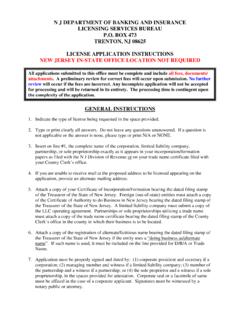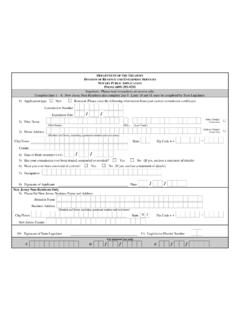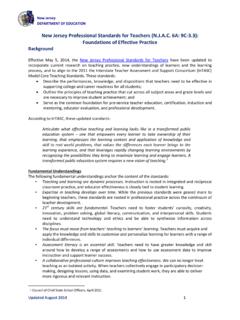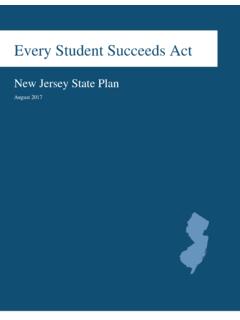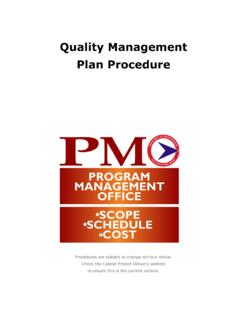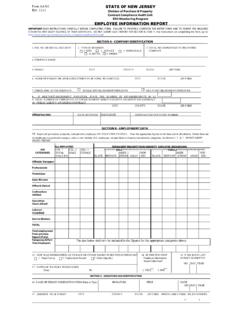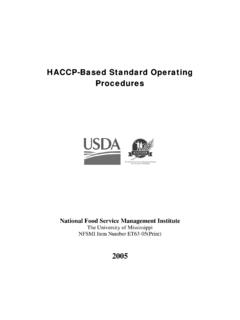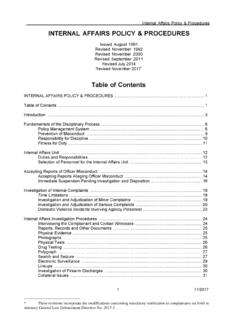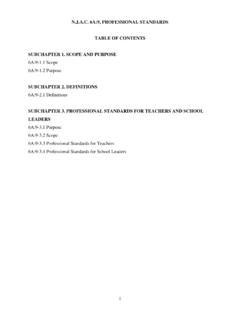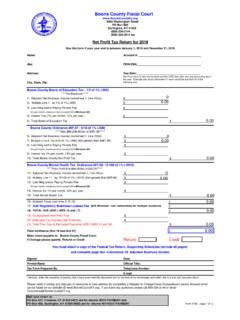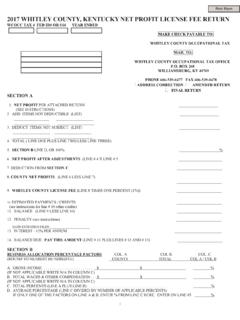Transcription of Partnership Filing Fee and Nonresident Partner Tax
1 Partnership Filing Fee and Nonresident Partner Tax TB-55(R) Issued July 13, 2016. Tax: Partnership For tax years beginning on or after January 1, 2015, the Division created two new Partnership Tax returns, Forms NJ-1065 and NJ-CBT-1065. Form part -100, which partnerships previously used to report both the Gross Income Tax Filing fee and the Corporation Business Tax, was eliminated for tax years beginning on or after January 1, 2015. Partnership Filing FEE. WHO MUST FILE. Every Partnership that has income or loss derived from sources in the State of New Jersey, or has any type of New Jersey resident Partner , must file Form NJ-1065. Partners subject to the Gross Income or Corporation Business Tax must report and pay tax on their share of Partnership income or loss.
2 In accordance with 54A:8-6(b) (2) (A), a Partnership that has more than two owners and New Jersey source income (or loss), must pay a per-owner Filing fee subject to the exceptions discussed below. Partnerships compute and report the Filing fee on Form NJ-1065. DUE DATE. Returns are due on the 15th day of the fourth month after the end of the tax year. A Partnership that has a Filing fee due can request an extension of time to file its Form NJ- 1065 and may be granted that extension if it has paid 80% of the Filing fee by the original due date of the return . There is no extension of time for payment of the Filing fee. The full amount of the Filing fee must be paid on or before the original due date of the NJ-1065 tax return .
3 Along with the Filing fee, the Partnership must also pay one-half of the tax year's Filing fee as a prepayment of the next year's Filing fee on that date. If the Filing fee is not paid by the original due date of the Partnership return ( , April 15th for a calendar year Partnership ), the Division will assess late payment penalties and interest for the Filing fee. AMOUNT DUE. Partnerships must pay $150 for each individual, trust, estate, or entity, including any pass- through entity that owns a Partnership interest, up to a maximum of $250,000. In addition, the Partnership must pay one-half of the Filing fee for the tax year as the prepayment towards the Filing fee for the next tax year.
4 Nonprofit owners are not exempt from the fee. The total fee amount due is generally determined by the number of K-1's filed by, or due from, the Partnership , regardless of whether the Partnership is a qualified investment Partnership , tiered Partnership , or other pass-through entity. The Partnership must pay the fee for every owner, even if it does not provide each one with a K-1. With regard to tiered partnerships, each Partnership must pay the Filing fee required for its partners. There is no exemption/proration of the fee for partners that own an interest for only a portion of the year. Similarly, there is no exemption/proration of the fee if the Partnership was in existence Page 1.
5 For only part of the tax year for which the NJ-1065 is due. If a Partnership dissolves shortly after the end of a tax year before Filing the return for that tax year, the Filing fee is due for that tax year, plus one-half of that fee as the prepayment towards the Filing fee for the next year (the next tax year being a partial year). When Final return is checked off on the NJ-1065 return , no prepayment of the next year's fee is required; however, the Filing fee for the final return is required. The full $150 Filing fee is due for each Nonresident Partner that has physical nexus with New Jersey. If the Partnership has income earned outside New Jersey, the Filing fee for Nonresident partners that do not have physical nexus with New Jersey may be apportioned based on New Jersey source income.
6 The Partnership must use Schedule J of the Corporation Allocation Schedule on Form NJ-1065 for Nonresident partners lacking nexus. FORMS. The Partnership must remit the Filing fee with the Partnership Payment Voucher (NJ-1065-V). Form part -200-T is to request an extension of time to file Form NJ-1065 if the entity has a Filing fee due. Filing FEE EXCEPTIONS. Exemptions include a Partnership that has no New Jersey source income, expenses, or loss. To qualify for this exception, all of the Partnership 's operations and facilities must be located outside New Jersey. Generally, if the Partnership has New Jersey source expenses, deductions, or losses, it will not qualify for this exception.
7 For example, if a Partnership owns undeveloped land in New Jersey, the Partnership has New Jersey source expenses resulting from real property taxes on the land. On the other hand, fees paid for a New Jersey checking account or to a New Jersey accounting firm are not sourced to New Jersey for purposes of liability for the Filing fee. Similarly, the fee paid for Filing an annual report in New Jersey, without more, will not be sourced to New Jersey for purposes of Filing fee liability. A Partnership that has hedge fund status (see below), does not qualify for this exception and a Filing fee is due for all partners, unless all of the Partnership 's operations and facilities are located outside New Jersey.
8 Partnership is an Investment Club. If the Partnership meets the definition of investment club . (see below), the Partnership is exempt from payment of Filing fees. TIME LIMIT FOR ASSESSING ADDITIONAL Filing FEES. Under the Gross Income Tax Act, the Division of Taxation has three years from the date the entity filed its Partnership return or the original due date of the return , whichever is later, to send a bill for additional Filing fees. This rule and its exceptions are in 54A:9-4. Page 2. Nonresident Partner TAX. WHO MUST FILE. In accordance with 54 , a Partnership must pay tax on behalf of its Nonresident Partner (s) that have New Jersey allocated income.
9 A Partnership must file Form NJ-CBT-1065. when the entity is required to calculate a tax on its Nonresident Partner (s). When a Nonresident Partner files a New Jersey income tax return , such as an NJ-1040NR or CBT-100, the Partner must be sure to attach a copy of its NJK-1 to take a credit for the tax paid by the Partnership on the Partner 's behalf. DUE DATE. Returns are due on the 15th day of the fourth month after the end of the tax year. A Partnership that has a tax due can request an extension of time to file its Form NJ-CBT-1065 and may be granted an extension of time if it has 90% of the total tax reported on Form NJ-CBT-1065 paid in by the original due date of the return .
10 The Nonresident Partner tax must be paid by the original due date for Filing Form NJ-CBT-1065. If the Nonresident Partner tax is not paid by the original due date of the Partnership return ( , April 15th for a calendar year Partnership ), the Division will assess late payment penalties and interest for the tax due. AMOUNT DUE. The tax rate is for Nonresident noncorporate partners ( , individuals, trusts, and estates), and 9% for Nonresident corporate partners of the allocable share of entire net income. FORMS. The Partnership must remit the Nonresident Partner tax with the Corporation Business Tax Partnership Payment Voucher (NJ-CBT-V).
